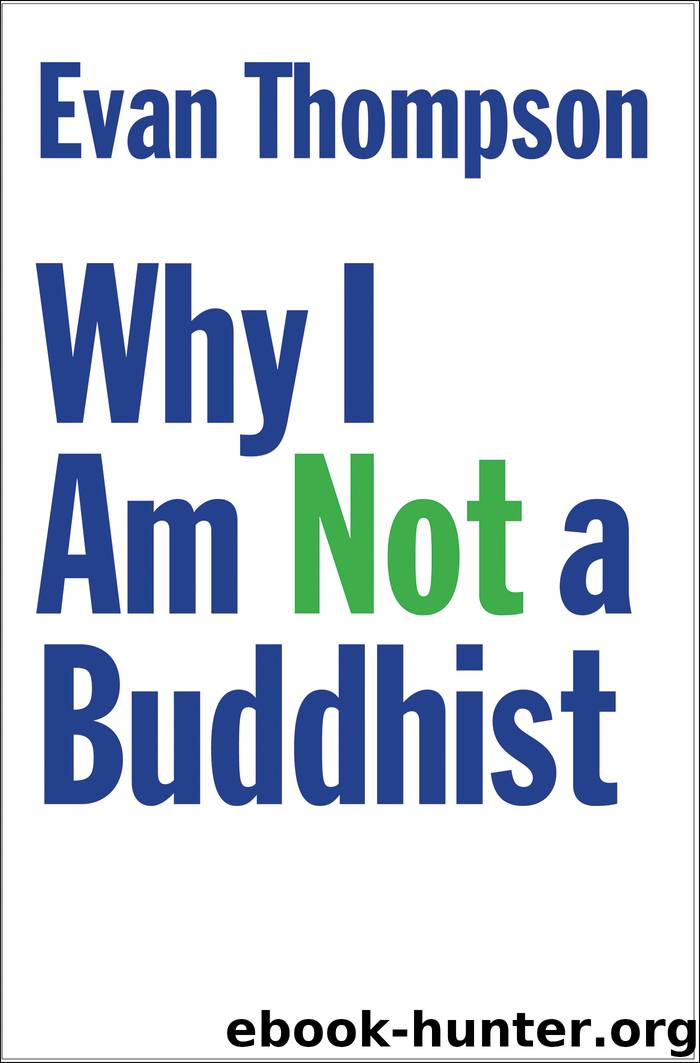Why I Am Not a Buddhist by Evan Thompson

Author:Evan Thompson
Language: eng
Format: epub
Publisher: Yale University Press
Published: 2020-01-29T16:00:00+00:00
4
mindfulness mania
Mindfulness mania is rampant in North American society.1 Mindful living, mindful parenting, mindful eating, mindful sex, mindful leadership, mindful coloring books—the list goes on. A story in Wired proclaims, “In Silicon Valley, Meditation Is No Fad. It Could Make Your Career.”2 A Forbes column declares, “Why Mindfulness Techniques Can Bring You Success in a Wired World.”3 The subtitle of yet another self-help book, The Mindfulness Edge, reads “How to Rewire Your Brain for Leadership and Personal Excellence Without Adding to Your Schedule.”4 There is even a place called MNDFL, which says that it “exists to make humans feel good” and advertises itself as “New York City’s premier meditation studio.”5 The Atlantic describes it as “A Gym for Mindfulness,” while Vogue calls it “Manhattan’s Must-Visit Meditation Studio.”6
Many Buddhists bemoan this narcissism and mass marketing of mindfulness. They point out that mindfulness isn’t an ethically neutral technique for reducing stress and improving concentration; it’s a practice for increasing wholesome mental states and behaviors and decreasing unwholesome ones. “Right mindfulness,” which is the seventh part of the Buddhist “Eightfold Path,” requires self-restraint and concern for the welfare of others. It’s incompatible with greed and shouldn’t be marketed as a commodity for personal or corporate enhancement and one that reinforces the status quo. Some Buddhist critics have called this commodification “McMindfulness.”7
This critique is fine as far as it goes. But it’s superficial. Social critics, philosophers, and scholars of religion have long pointed out that the modern fetishizing of Buddhism and yoga, and Asian religions in general, fits perfectly into a consumerist corporate culture that needs to pacify itself from the endless stress of global capitalism.8 It’s undeniable that mindfulness techniques have become one means to achieve this end, and it’s undeniable that Buddhist modernism has been a driving force for making them into an international marketable commodity for individual “happiness” and “peace of mind.”9
Sometimes people insist that this trend isn’t “authentically” Buddhist. The idea of “authentic Buddhism,” however, is unhelpful. Buddhism is a constantly evolving tradition that has taken numerous forms throughout its history. It’s a missionary religion and has always been enmeshed in the economic systems of its home cultures. For example, the Buddha and his followers relied on lay donations. Rich bankers, caravan merchants, and powerful rulers supported the Buddha and the later establishment of monasteries, and in return they received religious “merit.” Buddhism spread throughout Asia on the Silk Road trade routes between India and China. So, if one intends to criticize mass-marketed mindfulness, the criticisms have to be made on grounds other than appealing to authenticity and economic purity.
Another nonstarter is disparaging Buddhist modernist conceptions of mindfulness in favor of traditional ones. Buddhism has no single, agreed-upon traditional understanding of mindfulness. Rather, Buddhism offers multiple and sometimes incompatible conceptions of mindfulness.10 The word “mindfulness” translates the Sanskrit smṛti or the Pali sati, which means “memory.” In the context of meditation, it refers to the ability to hold a chosen object in mind without distraction or forgetfulness. According to some
Download
This site does not store any files on its server. We only index and link to content provided by other sites. Please contact the content providers to delete copyright contents if any and email us, we'll remove relevant links or contents immediately.
The Lost Art of Listening by Michael P. Nichols(7494)
Why I Am Not A Calvinist by Dr. Peter S. Ruckman(4149)
The Rosicrucians by Christopher McIntosh(3513)
Wicca: a guide for the solitary practitioner by Scott Cunningham(3167)
Signature in the Cell: DNA and the Evidence for Intelligent Design by Stephen C. Meyer(3132)
Real Sex by Lauren F. Winner(3014)
The Holy Spirit by Billy Graham(2944)
To Light a Sacred Flame by Silver RavenWolf(2814)
The End of Faith by Sam Harris(2733)
The Gnostic Gospels by Pagels Elaine(2527)
Waking Up by Sam Harris(2454)
Nine Parts of Desire by Geraldine Brooks(2361)
Jesus by Paul Johnson(2352)
Devil, The by Almond Philip C(2325)
The God delusion by Richard Dawkins(2305)
Heavens on Earth by Michael Shermer(2278)
Kundalini by Gopi Krishna(2180)
Chosen by God by R. C. Sproul(2161)
The Nature of Consciousness by Rupert Spira(2104)
